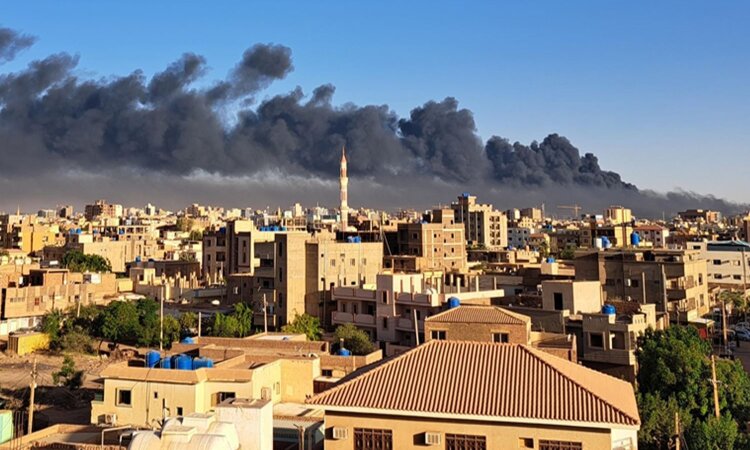Stopping Sudan’s Descent into Full-Blown Civil War Crisis Group

Sudan Events – Summerized -Sumaya Sayed
The nightmare scenario that many feared in Sudan is unfolding. In cities and towns across the country, including the capital Khartoum, the Sudanese army, led by General Abdelfattah al-Burhan, and the paramilitary Rapid Support Forces (RSF), under the command of Mohamed “Hemedti” Hamdan Dagalo, are fighting pitched battles. Millions of civilians are caught in the crossfire and fast running out of basic necessities. The combat could quickly slide into a sustained war that risks rippling through the country’s restive peripheries into its neighbours. Acting in concert, Sudanese, African, Gulf Arab, Western and other actors – some of whom have close ties to Burhan and Hemedti – should demand that the belligerents, both of whom believe they can attain their goals on the battlefield, agree to a ceasefire. The impending Eid al-Fitr celebration marking the end of the holy month of Ramadan – one of the most important days on the calendar for Sudanese Muslims – is a compelling opportunity for the army and paramilitary leaders to call a halt to the war, give beleaguered civilians a respite and allow mediators to fly into Khartoum to jump-start talks.
Fighting broke out on 15 April, after days of escalating armed manoeuvres by the rivalrous forces. Tensions had run high for days amid a dispute related to demands from the army that the RSF dissolve, with its members to be integrated into regular military ranks. It is unclear who fired the first shot, but both sides had clearly prepared for battle. Clashes erupted first in Khartoum, spreading rapidly to major towns to the north, south, east and west. Since then, the momentum has swung back and forth, with the two sides issuing conflicting claims to be in control of key institutions. What is unambiguous is the human toll.
The Burhan-Hemedti partnership was shaky from the start, as Crisis Group warned it would probably be. It grew increasingly unstable as military rule persisted, especially as Hemedti’s power and ambitions grew along with his paramilitary force, which expanded across the country. The rivalry showed even more signs of strain after Burhan and Hemedti deposed the civilian government in an October 2021 coup.
Subsequently, Hemedti’s rift with Burhan grew wider still. In courting the civilian elites, Hemedti exploited the fact that many of them – much as they distrust the RSF – view the army as their historical enemy, a redoubt of Bashir sympathisers including Islamists who had staffed the former president’s bureaucracy. In December 2022, a framework agreement promising to restore civilian rule accentuated their rivalry. While Burhan signed the deal only under heavy external pressure, Hemedti championed it, due to clauses he saw as giving him autonomy from Burhan and the army.
Tensions escalated in February and early March, following intense competition between the army and RSF to recruit new members across Sudan and particularly in Darfur, Hemedti’s stronghold. Rumours that the army was re-establishing a border guard historically tied to Hemedti’s long-time rival, Musa Hilal, head of a tribal militia that had helped suppress the Darfur revolt in the 2000s, further intensified the animosity between the regular army and its paramilitary foe. Burhan’s proposal to dissolve the Sovereign Council and form a new military council also heightened frictions, as it implied that Burhan could strip Hemedti of his formal political position as deputy chair. After an alarming military build-up in the capital, Burhan and Hemedti reached a deal to de-escalate the situation on 11 March. Hemedti agreed to withdraw forces from greater Khartoum, and the two military leaders agreed to form a new joint security committee.
The hostilities between the army and RSF have pushed the country toward the full-blown civil war Sudanese have dreaded for years. Because both sides are positioned in major urban bases across the country, fighting broke out nearly simultaneously all over the map, most prominently in Khartoum and Darfur. Although Sudan is no stranger to internal conflict, sustained urban warfare in Khartoum is unprecedented. Millions there are trapped in a burgeoning humanitarian disaster. While the Sudanese air force bombs the capital, civilians hunker down inside their homes without electricity amid sweltering temperatures. Many lack water as well. Residents have covered social media with reports of shops and homes being ransacked for supplies, with most pointing fingers at the RSF, who appear to be trying to overcome their aerial disadvantage by fanning out into residential neighbourhoods. The picture may be just as grim in other parts of the country, where information is harder to come by.



